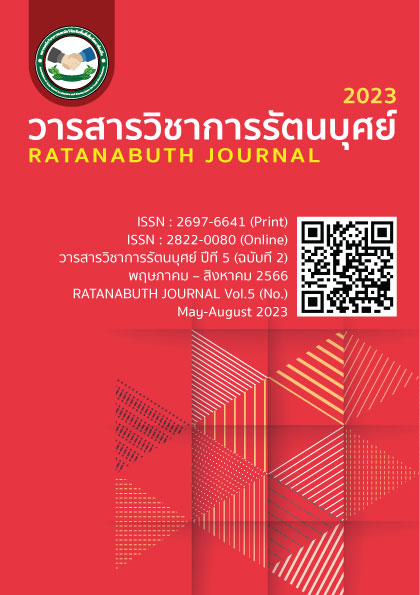Knowledge Sharing and Innovative Work Behaviors of Supervisory-Level Employees in a Packaging Manufacturing Company Knowledge Sharing and Innovative Work Behaviors of Supervisory-Level Employees in a Packaging Manufacturing Company
Main Article Content
Abstract
The objective of this research was to study the Factors affecting Knowledge Sharing and Innovative Work Behavior model and verify the consistency of the developed model with empirical data. The quantitative research method is employed. The sample group are 350 supervisory-level employees at Thai Containers Group Co., Ltd.. The questionnaire was employed as research instrument. Data is analyzed by the structural equation model (SEM).
The results of analyzed influence path model showed that Subjective Norm, Trust and Leader Member Exchange have a positive influence on Knowledge Sharing, and the Leader Member Exchange and Knowledge Sharing have a positive influence on the Innovative Work Behavior. The developed influence path model is consistent with the empirical data, the Chi-Square value are 364.199, with statistical significance at 0.06, The Chi-Square correlation are 1.194, and Comparative Fit Index (CFI) are 0.993, Goodness of Fit Index (GFI) are 0.944, Normed Fit Index (NFI) are 0.964, Root Mean Square Error of Approximation (RMSEA) are 0.024 and Root Mean Residual (RMR) are 0.018. The factors that have the most influence on Knowledge Sharing are Trust, Leader Member Exchange and Subjective Norm.
Article Details

This work is licensed under a Creative Commons Attribution-NonCommercial-NoDerivatives 4.0 International License.
References
Ajzen, I. (1991). The theory of planned behavior. Organizational Behavior and Human Decision Processes, 50(2), 179-211.
Ajzen, I. (2001). Nature and Operation of Attitudes. Annual Review of Psychology, 52(1), 27-58. Retrieved from https://doi.org/10.1146/annurev.psych.52.1.27
Augier, M., & Teece, D. J. (2007). Perspectives on research and development Organizing and Managing innovation in a (Global) knowledge-based- Economy. New Challenges for managers. Oxford: Oxford University Press., 198-212.
Balozi, M., Othman, S., & Isa, M. (2018). Mediating Effects of Subjective Norms on the Relationship between Career Advancement and Job Characteristics and Knowledge Sharing Behavior among Tanzanian Healthcare Professionals. Gadjah Mada International Journal of Business, 20(2), 187-203.
Hao, Q., Shi, Y., & Yang, W. (2019). How Leader-Member Exchange Affects Knowledge Sharing Behavior: Understanding the Effects of Commitment and Employee Characteristics. Frontiers in Psychology, 10. doi:10.3389/fpsyg.2019.02768
Janssen, O. (2000). Job Demands, Perceptions of Effort-Reward Fairness and Innovative Work Behavior. Journal of Occupational and Organizational Psychology, 73(3), 287-302.
Liu, S., Ye, L., Guo, M., Zhang, Q., & Lu, G. (2018). The Relationship between Leadership-member Exchange and Knowledge Sharing: From the Perspective of Social Relations. IEEE Xplore. doi:10.1109/IEIS.2018.8597963
Mayer, R. C., Davis, J. H., & Schoorman, F. D. (1995). An Integrative Model of Organization Trust. Academic of Management Review, 20(3), 709-734.
Nahapiet, J., & Ghoshal, S. (1998). Social Capital, Intellectual Capital, and The Organizational Advantage. Academy of Management Review, 242-266.
Phung, V., Hawryszkiewycz, I., & Chandran, D. (2019). How knowledge sharing leads to innovative work behaviour: A moderating role of transformational leadership. Journal of Systems and Information Technology, 21(3), 277-303. doi:10.1108/JSIT-11-2018-0148
Prusak, L. (2001). In Good Company: How Social Capital Makes Organizations Work. Harvard Business Press.
Rabia Ishrat, R., Rahman, W., & Rehman, W. (2021). An Empirical Investigation of the Effect of Subjective Norms on Knowledge Sharing: Gender Perspectives. CITY UNIVERSITY RESEARCH JOURNAL, 11(3).
Ramamoorthy, N., Flood, C., Slattery, T., & Sardessai, R. (2005). Determinants of Innovative Work Behavior:Development and Test of an Integrated Model. Creativity and Innovation Management, 14(2), 142-150.
Raza, I., & Awang, Z. (2020). Knowledge-sharing practices in higher educational institutes of Islamabad, Pakistan: an empirical study based on theory of planned behavior. Journal of Applied Research in Higher Education. doi:10.1108/JARHE-03-2020-0068.
Shehab, S., Rahim, R., & Daud, S. (2019). Knowledge Sharing Behavior of Nursing Supervisors in Online Healthcare Communities. International Journal of Pharmaceutical Research, 11.
Vandavasi, R., McConville, D., Uen, J., & Yepuru, P. (2020). Knowledge sharing, shared leadership and innovative behavior: a cross-level analysis. International Journal of Manpower, 41(8), 1221-1233. doi:10.1108/IJM-04-2019-0180.
Wu, Y., & Zhu, W. (2012). An integrated theoretical model for determinants of knowledge sharing behavior. Kybernetes, 41(10), 1462-1482.
โชติกา จันทร์อุ่ย. (2562). พฤติกรรมเชิงนวัตกรรมของพนักงานเจนเนอเรชั่นวาย : การไฟฟ้าฝ่ายผลิตแห่งประเทศไทย. มหาวิทยาลัยสงขลานครินทร์.


